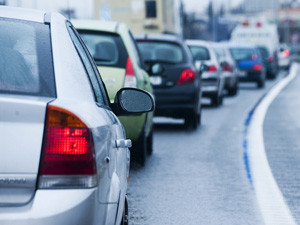
In a move the Congress of SA Trade Unions (Cosatu) hopes will demonstrate to government that it has no choice but to call off Gauteng e-tolls, a protest drive-slow will take place on Johannesburg's highways this morning.
As part of Cosatu's phased plan to stop the proposed open road tolling system, the group has been encouraging motorists throughout the week to take part in the demonstration that is expected to see traffic throughout the city's road network being vastly disrupted. Gauteng traffic police will be on the scene to escort the convoy, which is expected to be joined by about 100 vehicles.
According to Cosatu's provincial secretary, Dumisani Dakile, motorists will assemble at two different meeting points, in Johannesburg and Ekurhuleni, respectively.
From Cosatu House, in Jorissen Street, Braamfontein, motorists will proceed to the M1 North and move slowly through a trajectory via the Buccleuch Interchange, N1 South, M1 North, M2 East, and back to Cosatu House.
In Ekurhuleni, the drive will start at the old trade centre (now Mboro Church), in Alrode, and the convoy will join the N3 at the Heidelburg Road on-ramp, then drive North along the N3, N12, R24, and R21 to the Nelmapius off-ramp in Centurion and then back South on the R21, N12 West towards Johannesburg and back on to the N3 South, before dispersing at the starting point.
Cosatu says government must take into account the mass opposition to open road tolling in Gauteng. "Government must prioritise the roll-out of efficient, reliable, affordable and safe public transport for all the people of SA."
The trade union congress says it not only opposes the cost of e-tolls, but also the entire system in principle.
Among the evils the system will bring to bear, says Cosatu, are that of an added burden on the poor and the perpetuation of exclusion (owing to the fact that many won't be able to afford to use the best roads).
"Another reason for opposing the tolls is the cost of collection, which will consume a massive 17% of the money collected in tolls. This means that tolls are not only unfair but also a grossly inefficient way of raising the money for road improvements.
"Even if the government makes further cuts in levels of tolls, the collection costs will become an increasingly larger percentage of the amount collected," says Dakile.
Cosatu believes a large portion of the revenue collected will ultimately find its way into the pockets of the toll operators.
The group, which has been consistently vocal in the battle against e-tolls, says it will continue to protest, fighting the cause until government hears the voice of its people.
Cosatu's Gauteng chairperson, Phutas Tseki, says this is just the beginning - with further protests to follow next year. "In February, we will push the campaign to the next level. This is the beginning; next time we will close the roads for 24 hours and if government doesn't listen, we might close them for a week."
Share